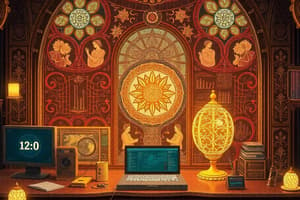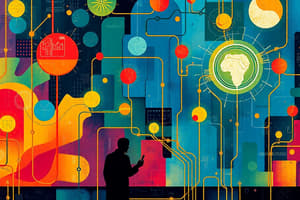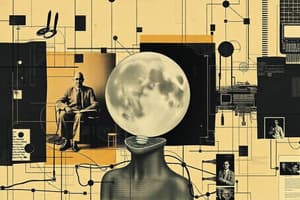Podcast
Questions and Answers
Which of the following are examples of advances in information technology in the past two decades? (Select all that apply)
Which of the following are examples of advances in information technology in the past two decades? (Select all that apply)
- Cloud (correct)
- World Wide Web (correct)
- IOT (correct)
- Cell Phones (correct)
- Email (correct)
- Abacus
Ethics deals with involuntary choices or choices outside the moral realm.
Ethics deals with involuntary choices or choices outside the moral realm.
False (B)
The use of IT in business requires balancing the needs of information users against the rights of the individuals whose information is being used.
The use of IT in business requires balancing the needs of information users against the rights of the individuals whose information is being used.
True (A)
What is the name of the Act that was passed in 1966 and amended in 1974 to provide the public with access to certain government records?
What is the name of the Act that was passed in 1966 and amended in 1974 to provide the public with access to certain government records?
What is the definition of 'Personal data' as defined by the PDPA?
What is the definition of 'Personal data' as defined by the PDPA?
What are the ethical dilemmas that arise from the growth of IT? (Select all that apply)
What are the ethical dilemmas that arise from the growth of IT? (Select all that apply)
The act of fraudulently using email to try and obtain personal data from the recipient, is called 'Phishing'.
The act of fraudulently using email to try and obtain personal data from the recipient, is called 'Phishing'.
What does 'Doxing' mean in the online context?
What does 'Doxing' mean in the online context?
The digital divide refers to the unequal access to modern IT between certain groups of people.
The digital divide refers to the unequal access to modern IT between certain groups of people.
What are the principal catalysts of the Information Age?
What are the principal catalysts of the Information Age?
What technologies can solve problems but also create new ones?
What technologies can solve problems but also create new ones?
In what year was the Intel 4004, the world's first microprocessor, released?
In what year was the Intel 4004, the world's first microprocessor, released?
Which organisation introduced the Altair 8800 computer?
Which organisation introduced the Altair 8800 computer?
What year was the IBM PC released?
What year was the IBM PC released?
The term "teletype" refers to a type of typewriter used for both output and input.
The term "teletype" refers to a type of typewriter used for both output and input.
The first electronic television was invented by Philo Farnsworth in 1927.
The first electronic television was invented by Philo Farnsworth in 1927.
What are the major milestones in networking?
What are the major milestones in networking?
What are the major milestones in information storage and retrieval?
What are the major milestones in information storage and retrieval?
What is the Personal Data Protection Act (PDPA) intended to achieve?
What is the Personal Data Protection Act (PDPA) intended to achieve?
'Public Wi-Fi' can compromise user security.
'Public Wi-Fi' can compromise user security.
What are the negative impacts of IT on society and social lives? (Select all that apply)
What are the negative impacts of IT on society and social lives? (Select all that apply)
What are the key areas of concern regarding the "Digital Divide"?
What are the key areas of concern regarding the "Digital Divide"?
What does the Freedom of Information Act (FOIA) aim to achieve?
What does the Freedom of Information Act (FOIA) aim to achieve?
The Official Secret Act in Malaysia has been replaced by the Freedom of Information Act.
The Official Secret Act in Malaysia has been replaced by the Freedom of Information Act.
What is the purpose of Internet filters?
What is the purpose of Internet filters?
Doxing refers to using a public platform to expose private information about an individual.
Doxing refers to using a public platform to expose private information about an individual.
What is the term for the use of works protected by copyright without permission?
What is the term for the use of works protected by copyright without permission?
What is the term for duplicated software that is distributed without authorization?
What is the term for duplicated software that is distributed without authorization?
What is "AI" short for?
What is "AI" short for?
What is the main concern regarding the "Rise of Robots" and automation?
What is the main concern regarding the "Rise of Robots" and automation?
Flashcards
Ethics in Computing
Ethics in Computing
The study of moral choices and actions related to computer technology.
Ethics
Ethics
The philosophical study of morality; examining moral beliefs and behaviour.
Morality
Morality
A society's rules of conduct, defining what is considered right or wrong.
Information Age
Information Age
Signup and view all the flashcards
Technology and Values
Technology and Values
Signup and view all the flashcards
Control over new technologies
Control over new technologies
Signup and view all the flashcards
Milestone in Computing
Milestone in Computing
Signup and view all the flashcards
Abacus
Abacus
Signup and view all the flashcards
Mechanical Calculators
Mechanical Calculators
Signup and view all the flashcards
Punch Cards
Punch Cards
Signup and view all the flashcards
Tabulators
Tabulators
Signup and view all the flashcards
ENIAC
ENIAC
Signup and view all the flashcards
UNIVAC
UNIVAC
Signup and view all the flashcards
Microprocessors
Microprocessors
Signup and view all the flashcards
Cell Phones
Cell Phones
Signup and view all the flashcards
Email
Signup and view all the flashcards
World Wide Web
World Wide Web
Signup and view all the flashcards
Cloud
Cloud
Signup and view all the flashcards
IOT
IOT
Signup and view all the flashcards
Fortran
Fortran
Signup and view all the flashcards
COBOL
COBOL
Signup and view all the flashcards
Ethics
Ethics
Signup and view all the flashcards
Morality
Morality
Signup and view all the flashcards
Information Age
Information Age
Signup and view all the flashcards
Technology and Values
Technology and Values
Signup and view all the flashcards
Control over technology
Control over technology
Signup and view all the flashcards
Ethics in Computing
Ethics in Computing
Signup and view all the flashcards
Abacus
Abacus
Signup and view all the flashcards
Mechancial Calculators
Mechancial Calculators
Signup and view all the flashcards
Punch Cards
Punch Cards
Signup and view all the flashcards
Tabulators
Tabulators
Signup and view all the flashcards
ENIAC
ENIAC
Signup and view all the flashcards
UNIVAC
UNIVAC
Signup and view all the flashcards
Microprocessors
Microprocessors
Signup and view all the flashcards
Cell Phones
Cell Phones
Signup and view all the flashcards
Email
Signup and view all the flashcards
World Wide Web
World Wide Web
Signup and view all the flashcards
Cloud
Cloud
Signup and view all the flashcards
IOT
IOT
Signup and view all the flashcards
Fortran
Fortran
Signup and view all the flashcards
COBOL
COBOL
Signup and view all the flashcards
Society
Society
Signup and view all the flashcards
Rapid Technological Change
Rapid Technological Change
Signup and view all the flashcards
Harmful Exploitation
Harmful Exploitation
Signup and view all the flashcards
Moral Choices
Moral Choices
Signup and view all the flashcards
Involuntary Choices
Involuntary Choices
Signup and view all the flashcards
Moral Realm
Moral Realm
Signup and view all the flashcards
Information Technology
Information Technology
Signup and view all the flashcards
Phishing
Phishing
Signup and view all the flashcards
Pornographic Websites
Pornographic Websites
Signup and view all the flashcards
Study Notes
Introduction to Professional Ethics in Computing
- Course title: BIC 21102
- Chapter 1 covers the introduction to the course
- Content includes ethics, computers, privacy, impact of information technology on society and social issues, computer impact and control, information access issues
Ethics
- Ethics is the philosophical study of morality, beliefs, and behavior.
- It's a rational, systematic analysis of conduct that can cause benefit or harm to others.
- People need to explain why they hold certain opinions about right and wrong behavior in society.
- Ethics includes the study of what it means to "do the right thing."
- Every society establishes rules of conduct, outlining what people should and shouldn't do.
- Society is rapidly changing as technology advances, increasing possibilities for exploitation by some individuals.
- Decisions about technology usage (e.g. phishing, pornography) require moral judgments: "good", "bad" or "neutral".
- Ethics focuses on voluntary, moral decisions people make.
Information Age
- Characterized by unprecedented information access.
- Principal catalysts include low-cost computers and high-speed communication networks.
- Advances in past two decades include cell phones, email, the World Wide Web, cloud computing, and the Internet of Things (IoT).
Technology and Values
- A dynamic interplay between technology and society.
- Progress in technology prompts shifts in societal norms and challenges.
- Technology can create new solutions and at the same time new problems, with benefits often accompanied by drawbacks.
- Examples include transportation (cars), food preservation (refrigerators) and communication (low cost global connectivity); with associated consequences such as traffic jams, food spoilage and job displacement.
Control over New Technologies
- Individuals have agency in adopting new technologies.
- Societal factors, such as government policies and laws, can play a role in shaping the rate at which new technologies are developed.
- Examples include decisions related to nuclear power and intellectual property laws.
Milestones in Computing
- A timeline of key developments in computing, from early aids to manual calculation (abacus) to modern computers and programming languages.
- Key achievements include the development of mechanical calculators, punch card tabulators, ENIAC, UNIVAC, the microprocessor (1969), and the IBM PC (1980).
Milestones in Networking
- A timeline of key developments in networking, from the early telegraph and telephone systems to modern applications.
- Key achievements include the telegraph, telephone, typewriter, radio, ARPANET, internet (TCP/IP), E-mail, NFSNET, and Broadband.
Milestones in Information Storage and Retrieval
- A timeline of key developments in information storage and retrieval, from early forms of documentation to modern data storage.
- Key achievements include the codex (an early book form) Gutenberg's press, newspapers, graphical user interfaces, networked hypertext, world wide web, single computer hypertext systems, and search engines.
Summary of IT Timeline
- Obsolete technologies and evolving trends in information technology are presented in specific YouTube links
- The impact of IT on society is discussed with YouTube links included.
Privacy Definition
- The PDPA (Personal Data Protection Act 2010) protects personal data in Malaysia from misuse.
- Personal data is defined as any information collected or processed for commercial transactions by automatic equipment.
- This includes names, addresses, phone numbers, email addresses, identification documents and banking details.
Privacy Protection and the Law
- Balancing the needs of those using information with the rights of the people whose information is collected is important.
- Data collection is necessary to improve business decisions, but data collection practices must be ethically sound.
- Privacy is a key concern for those who use the internet.
Recent History of Privacy Protection (U.S.)
- Laws such as the Communications Act of 1934, the Freedom of Information Act (FOIA), and the Fair Credit Reporting Act of 1970 regulate data collection practices and provide access to information in the U.S.
- The Children's Online Privacy Protection Act (COPPA) was implemented to address child online privacy concerns.
Impacts of IT Towards Society and Social
- Information technology encompasses devices used to create, store, manipulate, exchange, and disseminate data.
- The costs of IT devices are decreasing, capabilities are increasing.
- Increased use of IT brings challenges and issues (e.g., cybersecurity risks, digital divide, issues surrounding freedom of information).
- Significant impacts in areas such as in public places, education, homes, business and government sectors, as well as negative impacts such as identity theft, piracy, spamming, social media scandals
- Control over how technology is used is important to maintain societal values
Impacts on specific areas like Public Places
- Wireless internet access points are more common and can cause security issues
Impacts on Education
- Material is commonly found digitally rather than in printed format.
- Reliance on printed materials continues to diminish.
- There are many learning technologies.
Impacts on Business
- Increased productivity through automation and globalization.
- Technologies aid in creating worldwide business structures.
- Telecommuting became more prominent and acceptable.
- Monitoring workers to ensure compliance can be implemented.
Impacts on Government
- Censorship, web filters, and DNS redirection can be employed.
- Data collection and surveillance are prevalent.
- Issues surround regulation of public and private databases (e.g. sex offender registries).
- Implementing rules for privacy are relevant to law enforcement and privacy matters.
Impacts of IT Towards Society and Social (Negative Impacts)
- Pirated software results from illegal distribution/ copying of software programs.
- Piracy results in intellectual property violations.
- Identity theft is the unauthorized use of personal information for malicious purposes.
- Hackers and crackers seek to exploit vulnerabilities in information systems.
Cracking of Large Databases to Gain Personal Identity Information
- There can be attacks on databases containing personal data,
- Examples of past data breaches causing identity theft are given.
Phishing and Spyware
- Phishing involves creating fake websites that trick users into revealing personal data through email.
- Spyware secretly observes user actions, records data and typically transmits it back to a host computer or server.
Spamming
- Unsolicited email messages are labeled as spam and are detrimental to recipients' time and efforts.
- The CAN-SPAM Act was created to control email spam, but spamming continues despite guidelines.
Copyright Infringement and Pirated Software
- Copyright infringement involves unauthorized use of copyrighted works.
- Pirated software involves distributing unauthorized copies of software
Issues about Computer Impact and Control: Rise of Robot and AI
- Experts suggest that robots and artificial intelligence could lead to significant job displacement for humans.
- AI research in computer science focuses on developing machines showcasing intelligent behavior.
- Development in processor speed has resulted in great strides in Artificial Intelligence.
Issues about Computer Impact and Control: Digital Divide
- Some populations have access to modern information technologies while others do not.
- Issues surrounding internet access may result in digital divides, separating groups.
Information Access Issues: Freedom of Information
- Web access is valuable for obtaining updated information.
- Privileged users with access to information may make unethical use of their access privileges.
- Case studies provide examples of ethical failures involving leaked information.
Information Access Issues: Controlling Access to Information
- Internet restrictions can exist to prevent inappropriate material access.
- Controlling information on the Internet can be achieved via internet filters, as well as internet censorship.
Information Access Issues: Anonymity on the Internet
- Anonymous expression allows for opinion sharing without revealing the person's identity.
- However, anonymity is frequently misused for harmful purposes such as hate speech, cyberbullying, pornography, and online sexual predation.
Responsibility and Ethics on E-Access
- Questions your ethical responsibilities towards technology, specifically regarding electronic access.
Studying That Suits You
Use AI to generate personalized quizzes and flashcards to suit your learning preferences.
Related Documents
Description
This quiz focuses on the foundational concepts of ethics as they relate to computing. Chapter 1 of BIC 21102 introduces ethical theories, the impact of technology on society, and important issues surrounding privacy and information access. Explore the moral judgments necessary for navigating today's technological landscape.




